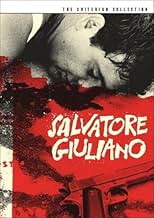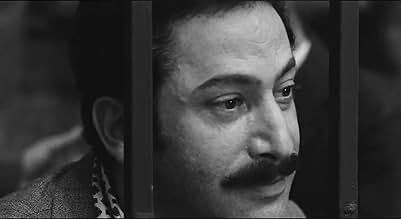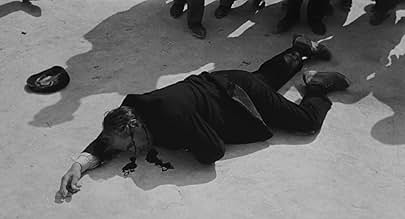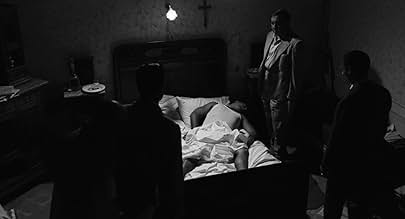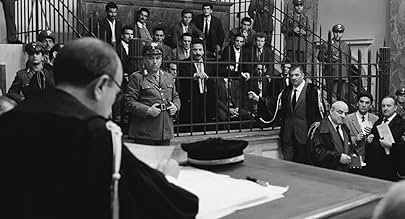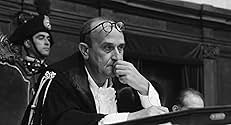Salvatore Giuliano
- 2h 5m
IMDb RATING
7.3/10
5.8K
YOUR RATING
The unclear and complicated twists between governal powers, independentist party and Mafia in the Sicily of the '40s culminate with the death of Salvatore Giuliano.The unclear and complicated twists between governal powers, independentist party and Mafia in the Sicily of the '40s culminate with the death of Salvatore Giuliano.The unclear and complicated twists between governal powers, independentist party and Mafia in the Sicily of the '40s culminate with the death of Salvatore Giuliano.
- Awards
- 6 wins & 4 nominations total
Frederico Zardi
- Pisciotta's Defense Counsel
- (uncredited)
Pippo Agusta
- Minor Role
- (uncredited)
Sennuccio Benelli
- Reporter
- (uncredited)
Giuseppe Calandra
- Minor Official
- (uncredited)
Pietro Cammarata
- Salvatore Giuliano
- (uncredited)
Max Cartier
- Francesco
- (uncredited)
Nando Cicero
- Bandit
- (uncredited)
Pietro Franzone
- Seperatist
- (uncredited)
Giovanni Gallina
- Bit Part
- (uncredited)
Vincenzo Norvese
- Bit Part
- (uncredited)
Carmelo Oliviero
- Don Nitto Minasola
- (uncredited)
Renato Pinciroli
- Pinciroli
- (uncredited)
Francesco Rosi
- Narrator
- (voice)
- (uncredited)
Giuseppe Teti
- Priest of Montelepre
- (uncredited)
Cosimo Torino
- Frank Mannino
- (uncredited)
7.35.7K
1
2
3
4
5
6
7
8
9
10
Featured reviews
Thought provoking
Review of Salvatore Giuliano (1962)
Directed by Francesco Rosi, Salvatore Giuliano (1962) is a gripping, politically charged Italian film that blends the genres of crime drama and historical reconstruction. The film portrays the life and death of Salvatore Giuliano, a real-life Sicilian bandit who became a legendary figure in post-war Italy. Giuliano's story is tragic, marked by his transformation from a rebellious hero to a notorious outlaw and his eventual murder under mysterious circumstances.
Rosi's approach to the material is unique. The film doesn't rely on a traditional narrative structure but instead unfolds in a fragmented, almost documentary-like fashion, presenting the story from various perspectives. This method of storytelling creates a sense of disorientation, mirroring the confusion and corruption of the political and social forces at play in post-WWII Sicily. By juxtaposing the personal tragedy of Giuliano with the larger political landscape of Italy, the film reveals the complex intersections between crime, politics, and the Sicilian mafia.
The performances are strong, with a particularly noteworthy portrayal of Giuliano by Marcello Mastroianni, whose quiet intensity brings depth to a character that is both a symbol of resistance and a product of the violent environment in which he lives. Rosi's direction maintains a cold, observational tone, which works well to emphasize the film's themes of disillusionment and betrayal.
Visually, the film is stunning, with cinematography that captures the stark beauty of the Sicilian landscape while also reflecting the harsh realities of life for the people caught in the web of organized crime and political corruption. The stark black-and-white visuals, coupled with the atmospheric score by Francesco De Masi, enhance the film's somber and tense mood.
Salvatore Giuliano is an excellent example of the political cinema that emerged in Italy during the post-neorealist era. It's not just a crime story; it's an exploration of the corruption and disillusionment that permeated Italian society during the 1940s and '50s. While the film might feel slow or fragmented at times, its depth and ambition make it a fascinating and insightful watch for those interested in the intersection of politics, history, and cinema.
Rating: 4/5 - A thought-provoking, well-crafted historical drama that shines a light on the murky intersection of crime and politics in post-war Sicily.
Directed by Francesco Rosi, Salvatore Giuliano (1962) is a gripping, politically charged Italian film that blends the genres of crime drama and historical reconstruction. The film portrays the life and death of Salvatore Giuliano, a real-life Sicilian bandit who became a legendary figure in post-war Italy. Giuliano's story is tragic, marked by his transformation from a rebellious hero to a notorious outlaw and his eventual murder under mysterious circumstances.
Rosi's approach to the material is unique. The film doesn't rely on a traditional narrative structure but instead unfolds in a fragmented, almost documentary-like fashion, presenting the story from various perspectives. This method of storytelling creates a sense of disorientation, mirroring the confusion and corruption of the political and social forces at play in post-WWII Sicily. By juxtaposing the personal tragedy of Giuliano with the larger political landscape of Italy, the film reveals the complex intersections between crime, politics, and the Sicilian mafia.
The performances are strong, with a particularly noteworthy portrayal of Giuliano by Marcello Mastroianni, whose quiet intensity brings depth to a character that is both a symbol of resistance and a product of the violent environment in which he lives. Rosi's direction maintains a cold, observational tone, which works well to emphasize the film's themes of disillusionment and betrayal.
Visually, the film is stunning, with cinematography that captures the stark beauty of the Sicilian landscape while also reflecting the harsh realities of life for the people caught in the web of organized crime and political corruption. The stark black-and-white visuals, coupled with the atmospheric score by Francesco De Masi, enhance the film's somber and tense mood.
Salvatore Giuliano is an excellent example of the political cinema that emerged in Italy during the post-neorealist era. It's not just a crime story; it's an exploration of the corruption and disillusionment that permeated Italian society during the 1940s and '50s. While the film might feel slow or fragmented at times, its depth and ambition make it a fascinating and insightful watch for those interested in the intersection of politics, history, and cinema.
Rating: 4/5 - A thought-provoking, well-crafted historical drama that shines a light on the murky intersection of crime and politics in post-war Sicily.
Matter-of-fact, yet punchy
Filmed in the actual Siciilian locations, this film is a fair attempt to strip away the myth surrounding bandit-cum-revolutionary Giuliano. In fact, he doesn't appear except as a gunned-down corpse at the beginning. The film winds back to unravel the events leading to his death, and forwards to its consequence. This is a clever method of achieving objectivity while at the same time subtly emphasising the man's elusive and mysterious qualities. To show Giuliano would have either been either hagiography or iconoclasm. The film rose above that and broadened its inquiry into the wider social and political context, effectively belittling him as the puppet of various forces jostling for position in Sicily after the war: bandits, police, local aristocracy, the Italian government, communists, and the Mafia.
This sets quite a challenge for itself, partly because of the vacuum at its centre, partly because of the obscurity and complexity of the real events. We are delivered to a chaotic courtroom to try to piece it together. The film finally latches onto Giuliano's lieutenant the only one who seems to know something of what is going on - but even he is silenced. It's all the more disturbing for the confusion.
Rosi is one of the best directors of crowds scenes and he gives raucous energy to any gathering of men, especially in the courtroom. He induces a kind of group hysteria in his actors; they are totally unaware of the camera and the result is an almost disturbing hyper-real feel (real crowds are dull in comparison) it's really something to appreciate. To get into this film, you need to invest something in the passions of the various parties involved - if not sympathise with them, then at least understand them. Without this, the danger is that it all boils down to so much petty bickering. The same might be said of the Godfather, which clearly owes a huge debt to Rosi's style.
Influential then, somewhat brave, with some fine directorial moments, and an interesting history lesson. Hard to actually like, but hard not to admire.
This sets quite a challenge for itself, partly because of the vacuum at its centre, partly because of the obscurity and complexity of the real events. We are delivered to a chaotic courtroom to try to piece it together. The film finally latches onto Giuliano's lieutenant the only one who seems to know something of what is going on - but even he is silenced. It's all the more disturbing for the confusion.
Rosi is one of the best directors of crowds scenes and he gives raucous energy to any gathering of men, especially in the courtroom. He induces a kind of group hysteria in his actors; they are totally unaware of the camera and the result is an almost disturbing hyper-real feel (real crowds are dull in comparison) it's really something to appreciate. To get into this film, you need to invest something in the passions of the various parties involved - if not sympathise with them, then at least understand them. Without this, the danger is that it all boils down to so much petty bickering. The same might be said of the Godfather, which clearly owes a huge debt to Rosi's style.
Influential then, somewhat brave, with some fine directorial moments, and an interesting history lesson. Hard to actually like, but hard not to admire.
Flawed, partly uninteresting but overall well made
Through the first hour of this film there are no focused characters, at most a character is seen in two or three short scenes. It's basically just following history and showing examples of it. Luckily it's not rushed, it's decently paced and it is realistic.
The best way to describe this is to call it a docu-drama. A narrator tells you something and then some people either do what's described or continues where the narrator leaves off. Though this approach can work, I did find it distancing in this film and it did make me less interested. The above competent direction and photography did elevate it however and for a long time I felt that it was great.
The films main problem is that we never really get to know anything, least of all about the title character who is despite the entire film being about his history only seen dead, or walking/running around. He only has a few lines.
Then towards the middle we experience two horrendous acts of overacting which damages the film severely. Both involving screaming/crying, the worst offender was the woman playing Giulianos mother. She screams and cries so awfully and in such a high tone that you wonder if you are watching a cheap parody. This scene is agonizingly long.
We do however learn a lot about the conflict going on and after a bit more than an hour, perhaps closer to 90 mins we get one character to follow. Overall I just don't think the film put us inside the conflict and despite giving us historical facts and let us understand the events we never got to the core. This made it cold and somewhat uninteresting for time to time. Not a film I would recommend but definitely a more or less good film.
6.5/10
The best way to describe this is to call it a docu-drama. A narrator tells you something and then some people either do what's described or continues where the narrator leaves off. Though this approach can work, I did find it distancing in this film and it did make me less interested. The above competent direction and photography did elevate it however and for a long time I felt that it was great.
The films main problem is that we never really get to know anything, least of all about the title character who is despite the entire film being about his history only seen dead, or walking/running around. He only has a few lines.
Then towards the middle we experience two horrendous acts of overacting which damages the film severely. Both involving screaming/crying, the worst offender was the woman playing Giulianos mother. She screams and cries so awfully and in such a high tone that you wonder if you are watching a cheap parody. This scene is agonizingly long.
We do however learn a lot about the conflict going on and after a bit more than an hour, perhaps closer to 90 mins we get one character to follow. Overall I just don't think the film put us inside the conflict and despite giving us historical facts and let us understand the events we never got to the core. This made it cold and somewhat uninteresting for time to time. Not a film I would recommend but definitely a more or less good film.
6.5/10
Poor Sicily between the Mafia and the Communist !!!
Francesco Rosi's cinema are around political matters, a tough subject too swallow for usual cinephiles, due the hard life which we lives are enough to stand, but some facts needs a better understanding as this picture suggests, how Sicily gets his independence from Italy is plentiful explained here, each facts were expose in this overlong picture, but Francesco wisely put forward a cursed triangle of forces, the mob, the separatists and the dangerous outlaws who help them in hope to get their crime's amnesty, after they got Sicily's autonomy starts another hard issue, the communist, such thing was totally inconceivable to Italian standards at it's time, a mass killing was prompt provides by the rich farmers and also by the mob, the Giuliano the leader almost didn't appears on the movie, his second on command and your fellows conrades in-arms were charged by the massacre, interesting picture over this dry land on Italy's south, the mountainous island Sicily !!!
Resume:
First watch: 2019 / How many: 1 / Source: DVD / Rating: 8
Resume:
First watch: 2019 / How many: 1 / Source: DVD / Rating: 8
Good but overrated
Interesting neo-realistic, quasi-documentary film with notable editing. But did the film deserve the Best Director award at Berlin over Bergman's "Through a glass darkly"? The Swedish film was superior. Martin Scorsese likes it because he can identify with the Italian politics and sociology of that time. The Rosi film is good but overrated.
Did you know
- TriviaMartin Scorsese credits this film as being one of his many inspirational sources for the look and style of his Taxi Driver (1976).
- GoofsWhen his mother comes to view and identify his corpse, Salvatore's stomach clearly moves as the actor struggles to control his breathing.
- ConnectionsEdited into Secret Dossier of the Mafia (1970)
- How long is Salvatore Giuliano?Powered by Alexa
Details
- Release date
- Country of origin
- Language
- Also known as
- Wer erschoß Salvatore G.?
- Filming locations
- 98 Via Serafino Mannone, Castelvetrano, Trapani, Sicily, Italy(Giuliano's body)
- Production companies
- See more company credits at IMDbPro
- Runtime
- 2h 5m(125 min)
- Color
- Sound mix
- Aspect ratio
- 1.85 : 1
Contribute to this page
Suggest an edit or add missing content

